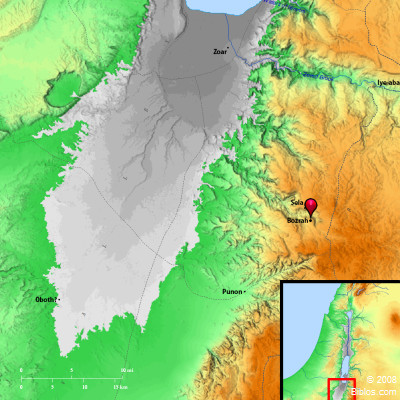Atlas  Esau (Bozrah) and surrounding region
Maps Created using Biblemapper 3.0Additional data from OpenBible.infoOccurrences Jeremiah 49:10 But I have made Esau bare, I have uncovered his secret places, and he shall not be able to hide himself: his seed is destroyed, and his brothers, and his neighbors; and he is no more. Obadiah 1:6 How Esau will be ransacked! How his hidden treasures are sought out! Obadiah 1:18 The house of Jacob will be a fire, the house of Joseph a flame, and the house of Esau for stubble. They will burn among them, and devour them. There will not be any remaining to the house of Esau." Indeed, Yahweh has spoken. Encyclopedia ESAUe'-so (`esaw, "hairy"; Esau):
Son of Isaac, twin brother of Jacob. The name was given on account of the hairy covering on his body at birth: "all over like a hairy garment" (Genesis 25:25). There was a prenatal foreshadowing of the relation his descendants were to sustain to those of his younger brother, Jacob (Genesis 25:23). The moment of his birth also was signalized by a circumstance that betokened the same destiny (Genesis 25:26).
The young Esau was fond of the strenuous, daring life of the chase-he became a skillful hunter, "a man of the field" ('ish sadheh). His father warmed toward him rather than toward Jacob, because Esau's hunting expeditions resulted in meats that appealed to the old man's taste (Genesis 25:28). Returning hungry from one of these expeditions, however, Esau exhibited a characteristic that marked him for the inferior position which had been foretokened at the time of his birth. Enticed by the pottage which Jacob had boiled, he could not deny himself, but must, at once, gratify his appetite, though the calm and calculating Jacob should demand the birthright of the firstborn as the price (Genesis 25:30-34). Impulsively he snatched an immediate and sensual gratification at the forfeit of a future glory. Thus he lost the headship of the people through whom God's redemptive purpose was to be wrought out in the world, no less than the mere secular advantage of the firstborn son's chief share in the father's temporal possessions. Though Esau had so recklessly disposed of his birthright, he afterward would have secured from Isaac the blessing that appertained, had not the cunning of Rebekah provided for Jacob. Jacob, to be sure, had some misgiving about the plan of his mother (Genesis 27:12), but she reassured him; the deception was successful and he secured the blessing. Now, too late, Esau bitterly realized somewhat, at least, of his loss, though he blamed Jacob altogether, and himself not at all (Genesis 27:34, 36). Hating his brother on account of the grievance thus held against him, he determined upon fratricide as soon as his father should pass away (Genesis 27:41); but the watchful Rebekah sent Jacob to Haran, there to abide with her kindred till Esau's wrath should subside (Genesis 27:42-45).
Esau, at the age of forty, had taken two Hittite wives, and had thus displeased his parents. Rebekah had shrewdly used this fact to induce Isaac to fall in with her plan to send Jacob to Mesopotamia; and Esau, seeing this, seems to have thought he might please both Isaac and Rebekah by a marriage of a sort different from those already contracted with Canaanitish women. Accordingly, he married a kinswoman in the person of a daughter of Ishmael (Genesis 28:6, 9). Connected thus with the "land of Seir," and by the fitness of that land for one who was to live by the sword, Esau was dwelling there when Jacob returned from Mesopotamia. While Jacob dreaded meeting him, and took great pains to propitiate him, and made careful preparations against a possible hostile meeting, very earnestly seeking Divine help, Esau, at the head of four hundred men, graciously received the brother against whom his anger had so hotly burned. Though Esau had thus cordially received Jacob, the latter was still doubtful about him, and, by a sort of duplicity, managed to become separated from him, Esau returning to Seir (Genesis 33:12-17). Esau met his brother again at the death of their father, about twenty years later (Genesis 35:29). Of the after years of his life we know nothing.
Esau was also called Edom ("red"), because he said to Jacob: "Feed me, I pray thee, with that same red pottage" (Genesis 25:30). The land in which he established himself was "the land of Seir," so called from Seir, ancestor of the Horites whom Esau found there; and called also Edom from Esau's surname, and, it may be, too, from the red sandstone of the country (Sayce).
"Esau" is sometimes found in the sense of the descendants of Esau, and of the land in which they dwelt (Deuteronomy 2:5 Obadiah 1:6, 8, 18, 19).
E. J. Forrester |




